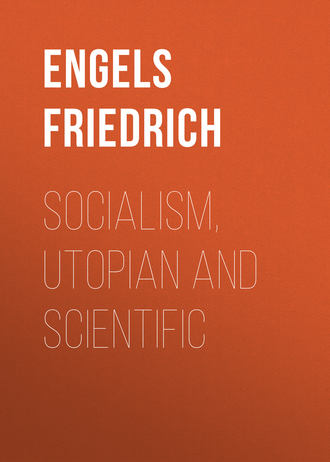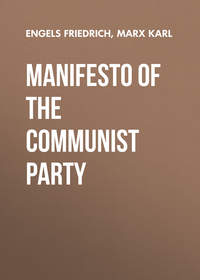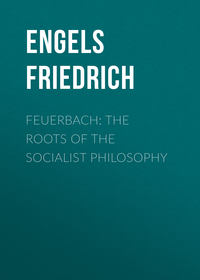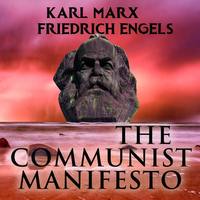 полная версия
полная версияSocialism, Utopian and Scientific
The long fight of the bourgeoisie against feudalism culminated in three great, decisive battles.
The first was what is called the Protestant Reformation in Germany. The war-cry raised against the Church by Luther was responded to by two insurrections of a political nature: first, that of the lower nobility under Franz von Sickingen (1523), then the great Peasants' War, 1525. Both were defeated, chiefly in consequence of the indecision of the parties most interested, the burghers of the towns – an indecision into the causes of which we cannot here enter. From that moment the struggle degenerated into a fight between the local princes and the central power, and ended by blotting out Germany, for two hundred years, from the politically active nations of Europe. The Lutheran reformation produced a new creed indeed, a religion adapted to absolute monarchy. No sooner were the peasants of North-east Germany converted to Lutheranism than they were from freemen reduced to serfs.
But where Luther failed, Calvin won the day. Calvin's creed was one fit for the boldest of the bourgeoisie of his time. His predestination doctrine was the religious expression of the fact that in the commercial world of competition success or failure does not depend upon a man's activity or cleverness, but upon circumstances uncontrollable by him. It is not of him that willeth or of him that runneth, but of the mercy of unknown superior economic powers: and this was especially true at a period of economic revolution, when all old commercial routes and centers were replaced by new ones, when India and America were opened to the world, and when even the most sacred economic articles of faith – the value of gold and silver – began to totter and to break down. Calvin's church constitution was thoroughly democratic and republican; and where the kingdom of God was republicanized, could the kingdoms of this world remain subject to monarchs, bishops, and lords? While German Lutheranism became a willing tool in the hands of princes, Calvinism founded a republic in Holland, and active republican parties in England, and, above all, Scotland.
In Calvinism, the second great bourgeois upheaval found its doctrine ready cut and dried. This upheaval took place in England. The middle-class of the towns brought it on, and the yeomanry of the country districts fought it out. Curiously enough, in all the three great bourgeois risings, the peasantry furnishes the army that has to do the fighting; and the peasantry is just the class that, the victory once gained, is most surely ruined by the economic consequences of that victory. A hundred years after Cromwell, the yeomanry of England had almost disappeared. Anyhow, had it not been for that yeomanry and for the plebeian element in the towns, the bourgeoisie alone would never have fought the matter out to the bitter end, and would never have brought Charles I. to the scaffold. In order to secure even those conquests of the bourgeoisie that were ripe for gathering at the time, the revolution had to be carried considerably further – exactly as in 1793 in France and 1848 in Germany. This seems, in fact, to be one of the laws of evolution of bourgeois society.
Well, upon this excess of revolutionary activity there necessarily followed the inevitable reaction which in its turn went beyond the point where it might have maintained itself. After a series of oscillations, the new center of gravity was at last attained and became a new starting-point. The grand period of English history, known to respectability under the name of "the Great Rebellion," and the struggles succeeding it, were brought to a close by the comparatively puny event entitled by Liberal historians, "the Glorious Revolution."
The new starting-point was a compromise between the rising middle-class and the ex-feudal landowners. The latter, though called, as now, the aristocracy, had been long since on the way which led them to become what Louis Philippe in France became at a much later period, "the first bourgeois of the kingdom." Fortunately for England, the old feudal barons had killed one another during the Wars of the Roses. Their successors, though mostly scions of the old families, had been so much out of the direct line of descent that they constituted quite a new body, with habits and tendencies far more bourgeois than feudal. They fully understood the value of money, and at once began to increase their rents by turning hundreds of small farmers out and replacing them by sheep. Henry VIII., while squandering the Church lands, created fresh bourgeois landlords by wholesale; the innumerable confiscations of estates, regranted to absolute or relative upstarts, and continued during the whole of the seventeenth century, had the same result. Consequently, ever since Henry VII., the English "aristocracy," far from counteracting the development of industrial production, had, on the contrary, sought to indirectly profit thereby; and there had always been a section of the great landowners willing, from economical or political reasons, to co-operate with the leading men of the financial and industrial bourgeoisie. The compromise of 1689 was, therefore, easily accomplished. The political spoils of "pelf and place" were left to the great land-owning families, provided the economic interests of the financial, manufacturing, and commercial middle-class were sufficiently attended to. And these economic interests were at that time powerful enough to determine the general policy of the nation. There might be squabbles about matters of detail, but, on the whole, the aristocratic oligarchy knew too well that its own economic prosperity was irretrievably bound up with that of the industrial and commercial middle-class.
From that time, the bourgeoisie was a humble, but still a recognized component of the ruling classes of England. With the rest of them, it had a common interest in keeping in subjection the great working mass of the nation. The merchant or manufacturer himself stood in the position of master, or, as it was until lately called, of "natural superior" to his clerks, his workpeople, his domestic servants. His interest was to get as much and as good work out of them as he could; for this end they had to be trained to proper submission. He was himself religious; his religion had supplied the standard under which he had fought the king and the lords; he was not long in discovering the opportunities this same religion offered him for working upon the minds of his natural inferiors, and making them submissive to the behests of the masters it had pleased God to place over them. In short, the English bourgeoisie now had to take a part in keeping down the "lower orders," the great producing mass of the nation, and one of the means employed for that purpose was the influence of religion.
There was another fact that contributed to strengthen the religious leanings of the bourgeoisie. That was the rise of materialism in England. This new doctrine not only shocked the pious feelings of the middle-class; it announced itself as a philosophy only fit for scholars and cultivated men of the world, in contrast to religion which was good enough for the uneducated masses, including the bourgeoisie. With Hobbes it stepped on the stage as a defender of royal prerogative and omnipotence; it called upon absolute monarchy to keep down that puer robustus sed malitiosus, to wit, the people. Similarly, with the successors of Hobbes, with Bolingbroke, Shaftesbury, etc., the new deistic form of materialism remained an aristocratic, esoteric doctrine, and, therefore, hateful to the middle-class both for its religious heresy and for its anti-bourgeois political connections. Accordingly, in opposition to the materialism and deism of the aristocracy, those Protestant sects which had furnished the flag and the fighting contingent against the Stuarts, continued to furnish the main strength of the progressive middle-class, and form even to-day the backbone of "the Great Liberal Party."
In the meantime materialism passed from England to France, where it met and coalesced with another materialistic school of philosophers, a branch of Cartesianism. In France, too, it remained at first an exclusively aristocratic doctrine. But soon its revolutionary character asserted itself. The French materialists did not limit their criticism to matters of religious belief; they extended it to whatever scientific tradition or political institution they met with; and to prove the claim of their doctrine to universal application, they took the shortest cut, and boldly applied it to all subjects of knowledge in the giant work after which they were named – the Encyclopédie. Thus, in one or the other of its two forms – avowed materialism or deism – it became the creed of the whole cultured youth of France; so much so that, when the great Revolution broke out, the doctrine hatched by English Royalists gave a theoretical flag to French Republicans and Terrorists, and furnished the text for the Declaration of the Rights of Man. The great French Revolution was the third uprising of the bourgeoisie, but the first that had entirely cast off the religious cloak, and was fought out on undisguised political lines; it was the first, too, that was really fought out to the destruction of one of the combatants, the aristocracy, and the complete triumph of the other, the bourgeoisie. In England the continuity of pre-revolutionary and post-revolutionary institutions, and the compromise between landlords and capitalists, found its expression in the continuity of judicial precedents and in the religious preservation of the feudal forms of the law. In France the Revolution constituted a complete breach with the traditions of the past; it cleared out the very last vestiges of feudalism, and created in the Code Civil a masterly adaptation of the old Roman law – that almost perfect expression of the juridical relations corresponding to the economic stage called by Marx the production of commodities – to modern capitalistic conditions; so masterly that this French revolutionary code still serves as a model for reforms of the law of property in all other countries, not excepting England. Let us, however, not forget that if English law continues to express the economic relations of capitalistic society in that barbarous feudal language which corresponds to the thing expressed, just as English spelling corresponds to English pronunciation —vous écrivez Londres et vous prononcez Constantinople, said a Frenchman – that same English law is the only one which has preserved through ages, and transmitted to America and the Colonies the best part of that old Germanic personal freedom, local self-government, and independence from all interference but that of the law courts, which on the Continent has been lost during the period of absolute monarchy, and has nowhere been as yet fully recovered.
To return to our British bourgeois. The French Revolution gave him a splendid opportunity, with the help of the Continental monarchies, to destroy French maritime commerce, to annex French colonies, and to crush the last French pretensions to maritime rivalry. That was one reason why he fought it. Another was that the ways of this revolution went very much against his grain. Not only its "execrable" terrorism, but the very attempt to carry bourgeois rule to extremes. What should the British bourgeois do without his aristocracy, that taught him manners, such as they were, and invented fashions for him – that furnished officers for the army, which kept order at home, and the navy, which conquered colonial possessions and new markets abroad? There was indeed a progressive minority of the bourgeoisie, that minority whose interests were not so well attended to under the compromise; this section, composed chiefly of the less wealthy middle-class, did sympathize with the Revolution, but it was powerless in Parliament.
Thus, if materialism became the creed of the French Revolution, the God-fearing English bourgeois held all the faster to his religion. Had not the reign of terror in Paris proved what was the upshot, if the religious instincts of the masses were lost? The more materialism spread from France to neighboring countries, and was reinforced by similar doctrinal currents, notably by German philosophy, the more, in fact, materialism and freethought generally became, on the Continent, the necessary qualifications of a cultivated man, the more stubbornly the English middle-class stuck to its manifold religious creeds. These creeds might differ from one another, but they were, all of them, distinctly religious, Christian creeds.
While the Revolution ensured the political triumph of the bourgeoisie in France, in England Watt, Arkwright, Cartwright, and others, initiated an industrial revolution, which completely shifted the center of gravity of economic power. The wealth of the bourgeoisie increased considerably faster than that of the landed aristocracy. Within the bourgeoisie itself, the financial aristocracy, the bankers, etc., were more and more pushed into the background by the manufacturers. The compromise of 1689, even after the gradual changes it had undergone in favor of the bourgeoisie, no longer corresponded to the relative position of the parties to it. The character of these parties, too, had changed; the bourgeoisie of 1830 was very different from that of the preceding century. The political power still left to the aristocracy, and used by them to resist the pretensions of the new industrial bourgeoisie, became incompatible with the new economic interests. A fresh struggle with the aristocracy was necessary; it could end only in a victory of the new economic power. First, the Reform Act was pushed through, in spite of all resistance, under the impulse of the French Revolution of 1830. It gave to the bourgeoisie a recognized and powerful place in Parliament. Then the Repeal of the Corn Laws, which settled, once for all, the supremacy of the bourgeoisie, and especially of its most active portion, the manufacturers, over the landed aristocracy. This was the greatest victory of the bourgeoisie; it was, however, also the last it gained in its own, exclusive interest. Whatever triumphs it obtained later on, it had to share with a new social power, first its ally, but soon its rival.
The industrial revolution had created a class of large manufacturing capitalists, but also a class – and a far more numerous one – of manufacturing work-people. This class gradually increased in numbers, in proportion as the industrial revolution seized upon one branch of manufacture after another, and in the same proportion it increased in power. This power it proved as early as 1824, by forcing a reluctant Parliament to repeal the acts forbidding combinations of workmen. During the Reform agitation, the working-men constituted the Radical wing of the Reform party; the Act of 1832 having excluded them from the suffrage, they formulated their demands in the People's Charter, and constituted themselves, in opposition to the great bourgeois Anti-Corn Law party, into an independent party, the Chartists, the first working-men's party of modern times.
Then came the Continental revolutions of February and March, 1848, in which the working people played such a prominent part, and, at least in Paris, put forward demands which were certainly inadmissible from the point of view of capitalistic society. And then came the general reaction. First the defeat of the Chartists on the 10th April, 1848, then the crushing of the Paris working-men's insurrection in June of the same year, then the disasters of 1849 in Italy, Hungary, South Germany, and at last the victory of Louis Bonaparte over Paris, 2nd December, 1851. For a time, at least, the bugbear of working-class pretensions was put down, but at what cost! If the British bourgeois had been convinced before of the necessity of maintaining the common people in a religious mood, how much more must he feel that necessity after all these experiences? Regardless of the sneers of his Continental compeers, he continued to spend thousands and tens of thousands, year after year, upon the evangelization of the lower orders; not content with his own native religious machinery, he appealed to Brother Jonathan, the greatest organizer in existence of religion as a trade, and imported from America revivalism, Moody and Sankey, and the like; and, finally, he accepted the dangerous aid of the Salvation Army, which revives the propaganda of early Christianity, appeals to the poor as the elect, fights capitalism in a religious way, and thus fosters an element of early Christian class antagonism, which one day may become troublesome to the well-to-do people who now find the ready money for it.
It seems a law of historical development that the bourgeoisie can in no European country get hold of political power – at least for any length of time – in the same exclusive way in which the feudal aristocracy kept hold of it during the Middle Ages. Even in France, where feudalism was completely extinguished, the bourgeoisie, as a whole, has held full possession of the Government for very short periods only. During Louis Philippe's reign, 1830-48, a very small portion of the bourgeoisie ruled the kingdom; by far the larger part were excluded from the suffrage by the high qualification. Under the second Republic, 1848-51, the whole bourgeoisie ruled, but for three years only; their incapacity brought on the second Empire. It is only now, in the third Republic, that the bourgeoisie as a whole have kept possession of the helm for more than twenty years; and they are already showing lively signs of decadence. A durable reign of the bourgeoisie has been possible only in countries like America, where feudalism was unknown, and society at the very beginning started from a bourgeois basis. And even in France and America, the successors of the bourgeoisie, the working people, are already knocking at the door.
In England, the bourgeoisie never held undivided sway. Even the victory of 1832 left the landed aristocracy in almost exclusive possession of all the leading Government offices. The meekness with which the wealthy middle-class submitted to this, remained inconceivable to me until the great Liberal manufacturer, Mr. W.A. Forster, in a public speech implored the young men of Bradford to learn French, as a means to get on in the world, and quoted from his own experience how sheepish he looked when, as a Cabinet Minister, he had to move in society where French was, at least, as necessary as English! The fact was, the English middle-class of that time were, as a rule, quite uneducated upstarts, and could not help leaving to the aristocracy those superior Government places where other qualifications were required than mere insular narrowness and insular conceit, seasoned by business sharpness.3 Even now the endless newspaper debates about middle-class education show that the English middle-class does not yet consider itself good enough for the best education, and looks to something more modest. Thus, even after the Repeal of the Corn Laws, it appeared a matter of course, that the men who had carried the day, the Cobdens, Brights, Forsters, etc., should remain excluded from a share in the official government of the country, until twenty years afterwards, a new Reform Act opened to them the door of the Cabinet. The English bourgeoisie are, up to the present day, so deeply penetrated by a sense of their social inferiority that they keep up, at their own expense and that of the nation, an ornamental caste of drones to represent the nation worthily at all State functions; and they consider themselves highly honored whenever one of themselves is found worthy of admission into this select and privileged body, manufactured, after all, by themselves.
The industrial and commercial middle-class had, therefore, not yet succeeded in driving the landed aristocracy completely from political power when another competitor, the working-class, appeared on the stage. The reaction after the Chartist movement and the Continental revolutions, as well as the unparalleled extension of English trade from 1848-1866, (ascribed vulgarly to Free Trade alone, but due far more to the colossal development of railways, ocean steamers, and means of intercourse generally), had again driven the working-class into the dependency of the Liberal party, of which they formed, as in pre-Chartist times, the Radical wing. Their claims to the franchise, however, gradually became irresistible; while the Whig leaders of the Liberals "funked," Disraeli showed his superiority by making the Tories seize the favorable moment and introduce household suffrage in the boroughs, along with a redistribution of seats. Then followed the ballot; then in 1884 the extension of household suffrage to the counties and a fresh redistribution of seats, by which electoral districts were to some extent equalized. All these measures considerably increased the electoral power of the working-class, so much so that in at least 150 to 200 constituencies that class now furnishes the majority of voters. But parliamentary government is a capital school for teaching respect for tradition; if the middle-class look with awe and veneration upon what Lord John Manners playfully called "our old nobility," the mass of the working-people then looked up with respect and deference to what used to be designated as "their betters," the middle-class. Indeed, the British workman, some fifteen years ago, was the model workman, whose respectful regard for the position of his master, and whose self-restraining modesty in claiming rights for himself, consoled our German economists of the Katheder-Socialist school for the incurable communistic and revolutionary tendencies of their own working-men at home.
But the English middle-class – the good men of business as they are – saw farther than the German professors. They had shared their power but reluctantly with the working-class. They had learnt, during the Chartist years, what that puer robustus sed malitiosus, the people, is capable of. And since that time, they had been compelled to incorporate the better part of the People's Charter in the Statutes of the United Kingdom. Now, if ever, the people must be kept in order by moral means, and the first and foremost of all moral means of action upon the masses is and remains – religion. Hence the parsons' majorities on the School Boards, hence the increasing self-taxation of the bourgeoisie for the support of all sorts of revivalism, from ritualism to the Salvation Army.
And now came the triumph of British respectability over the freethought and religious laxity of the Continental bourgeois. The workmen of France and Germany had become rebellious. They were thoroughly infected with socialism, and, for very good reasons, were not at all particular as to the legality of the means by which to secure their own ascendency. The puer robustus, here, turned from day to day more malitiosus. Nothing remained to the French and German bourgeoisie as a last resource but to silently drop their freethought, as a youngster, when sea-sickness creeps upon him, quietly drops the burning cigar he brought swaggeringly on board; one by one, the scoffers turned pious in outward behavior, spoke with respect of the Church, its dogmas and rites, and even conformed with the latter as far as could not be helped. French bourgeoisie dined maigre on Fridays, and German ones sat out long Protestant sermons in their pews on Sundays. They had come to grief with materialism. "Die Religion muss dem Volk erhalten werden," – religion must be kept alive for the people – that was the only and the last means to save society from utter ruin. Unfortunately for themselves, they did not find this out until they had done their level best to break up religion for ever. And now it was the turn of the British bourgeois to sneer and to say: "Why, you fools, I could have told you that two hundred years ago!"
However, I am afraid neither the religious stolidity of the British, nor the post festum conversion of the Continental bourgeois will stem the rising Proletarian tide. Tradition is a great retarding force, is the vis inertiæ of history, but, being merely passive, is sure to be broken down; and thus religion will be no lasting safeguard to capitalist society. If our juridical, philosophical, and religious ideas are the more or less remote offshoots of the economical relations prevailing in a given society, such ideas cannot, in the long run, withstand the effects of a complete change in these relations. And, unless we believe in supernatural revelation, we must admit that no religious tenets will ever suffice to prop up a tottering society.






